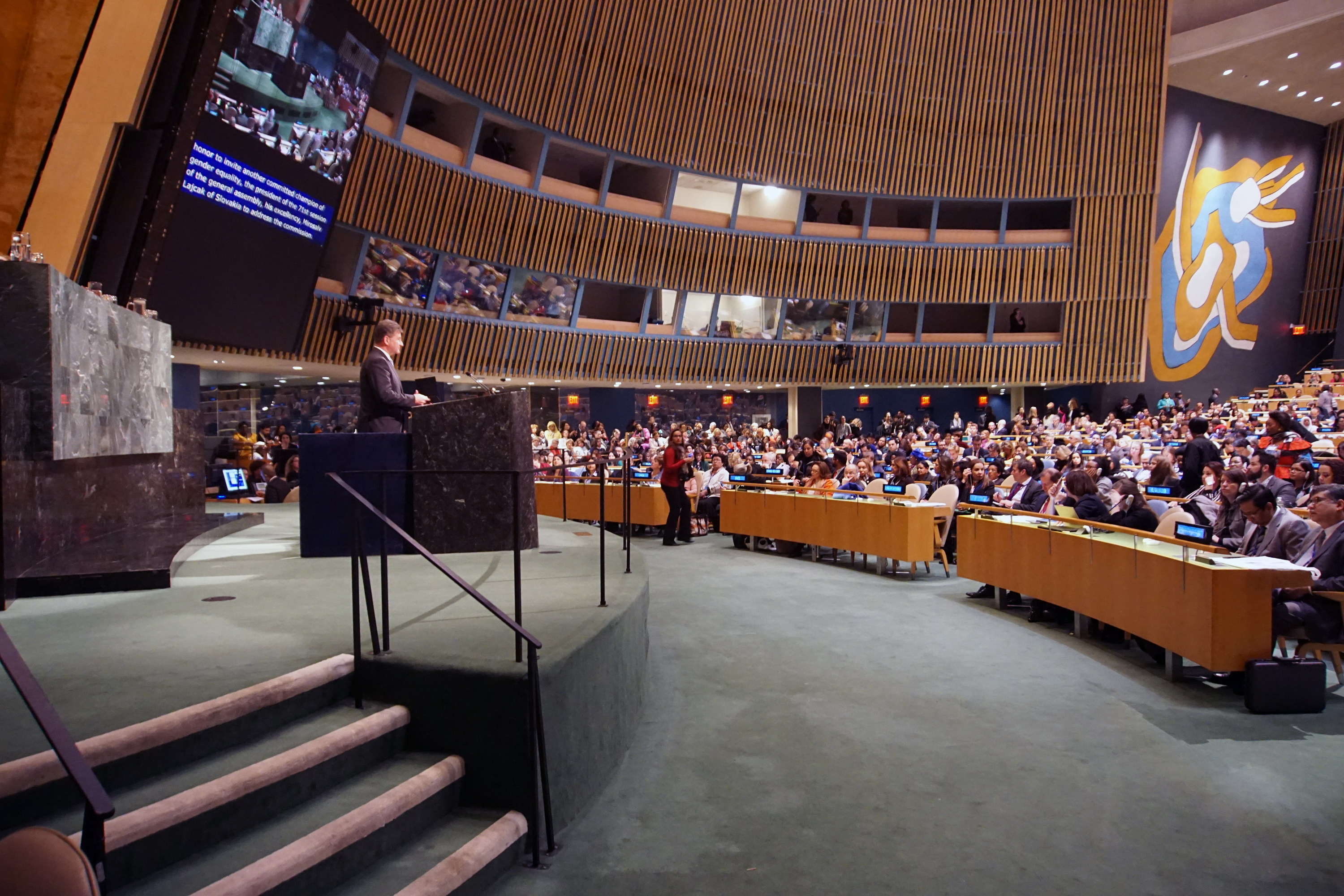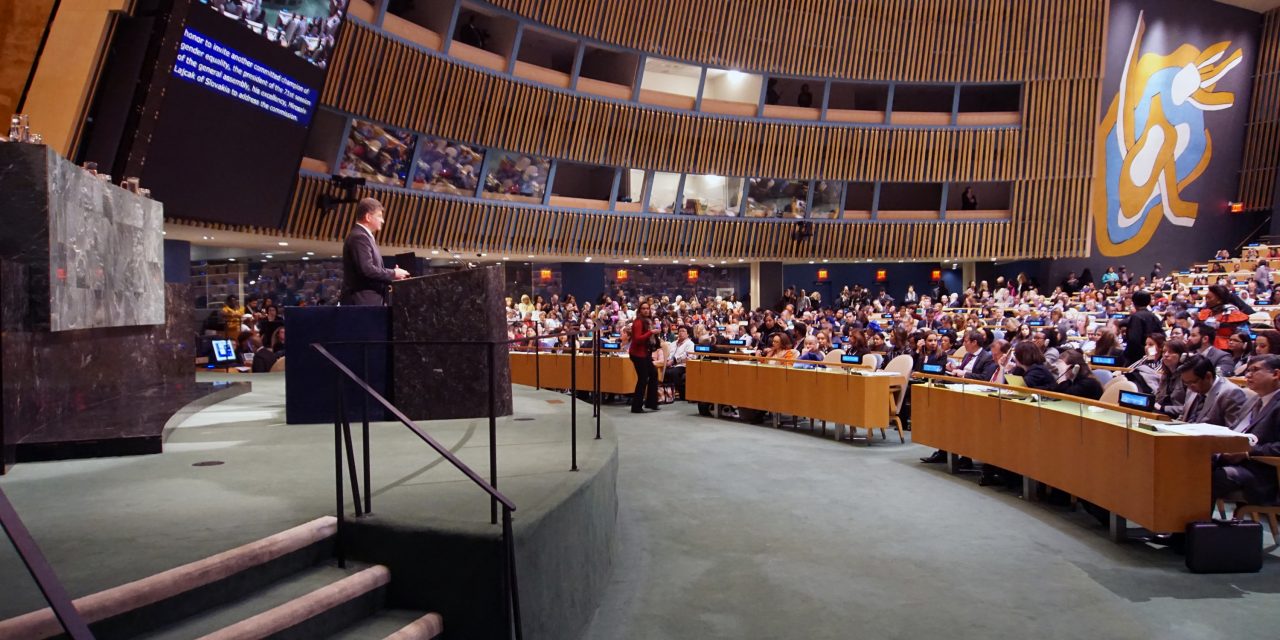Commission on the Status of Women

– As delivered –
Statement by H.E. Mr. Miroslav Lajčák, President of the 72nd Session of the UN General Assembly, at the opening segment of the 62nd session of the Commission on the Status of Women
Madame Chair, Mr. Secretary-General, Excellencies, Distinguished Delegates, Ladies and Gentlemen,
I am delighted to play a part in opening this session, of the Commission on the Status of Women.
And, I want to make three main points today – which I hope will help to frame the discussions ahead.
First, I want to reflect on the history and impact of the Commission.
It has played a fundamental role, within the United Nations system, since the very beginning.
CSW had its first meeting in 1947. Even from its early days, it took on monumental tasks. It contributed to the drafting of one of the most important instruments of this century: The Universal Declaration of Human Rights. And, it was the body which put pen to paper, and came up with our most comprehensive instrument yet, for women’s rights: The Convention on the Elimination of All Forms of Discrimination against Women.
In the past seven decades, the Commission has used its voice, and convening power, to push women to the top of the international agenda. And, of many national agendas too.
But, to understand its value – we need to look beyond its formal outcomes. And we need to acknowledge the reality – which is here, in front of us today.
Every year, for two weeks, the CSW transforms the United Nations. It brings gender champions, from all around the world, into these conference rooms. And, with them, comes real experience, and real stories, from the ground.
I have to say that I have never seen the United Nation more charged with energy than it is, during the CSW. Frankly, it should be like this – all the time. And maybe, someday, it will. But until then, we have to ensure that this gathering gets stronger, every year.
As my second point, I will focus on this year, in particular – and its crucial theme: Empowering Rural Women and Girls.
Rural women make up a quarter of the world’s population. I am sure we will hear this statistic many times, over the next two weeks. And I am glad. Because it has, too often, been overlooked.
It is no secret that we have made mistakes, in the past. We have tried to tackle challenges, without addressing their gender dimensions. This has had a particularly damaging effect on rural women.
It needs to stop. We need to take women into account, in everything we do. Particularly when it comes to rural communities.
- We cannot just talk about how only 20% of rural areas have access to drinking water. We must also talk about how women are more likely to go in search of water, when it is not readily available.
- We cannot just talk about how low education rates in rural areas are. We must also talk about how more rural women than rural men – in fact, about 50% of them – lack basic literacy skills.
- We cannot just talk about the effects of poverty and unemployment on rural communities. We must also talk about how the pay gap, between rural women and rural men, can be as high as 40%.
The reality is that rural women are not always on our television screens. They do not always make it into our headlines. They are not always in these conferences rooms. And they do not always have hashtags, or campaigns, launched in their names.
That is why we need a platform, like this one, to shine a spotlight on the challenges they face.
But, when we look, we will see that there are more than just challenges to find. Because, the empowerment of rural women will result in opportunities. Not just for them – but for us all. And that is my third point today.
Rural women act as a major source of innovation, and ideas. Take, for example, a woman named Sunita Kashyap. Her organisation supports 3000 women farmers in India to grow and sell their own crops. Or, Mariama Mamane, a young woman I met on a recent trip to Nairobi. She developed an eco-solution to improve the availability of irrigation and drinking water, while also producing energy.
These kinds of women do not need our help, in finding solutions. What they need is our support, in turning their ideas into reality.
This support is not just critical; it is smart. Because it will allow us all to see progress, across the board – from agriculture and education, to the rule of law and peace.
We need to keep calling. Until all of our words have become action. Until all of our agreements have become reality. Until all of our commitments have become facts on the ground. And until every woman, sitting in this room today, has the same rights, and the same opportunities, as the man sitting beside her.
Excellencies,
Sometimes, it can seem that we all agree:
- That the rights of women must be realised.
- That neither peace, nor development, can take hold without women’s participation and leadership.
- And that gender equality is an urgent priority.
So, this can beg the question: should we keep calling for things that we all seem to agree on?
And, the answer is: yes.
We need to keep calling. Until all of our words have become action. Until all of our agreements have become reality. Until all of our commitments have become facts on the ground.
And until every woman, sitting in this room today, has the same rights, and the same opportunities, as the man sitting beside her.
Thank you for continuing your calls. Let’s make them stronger this year than ever.
Thank you.
